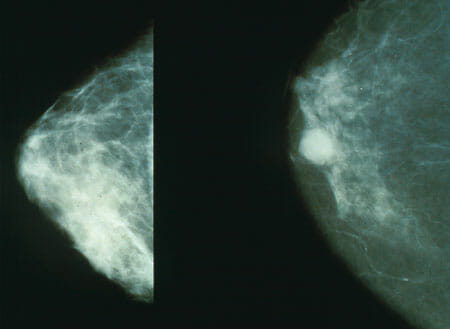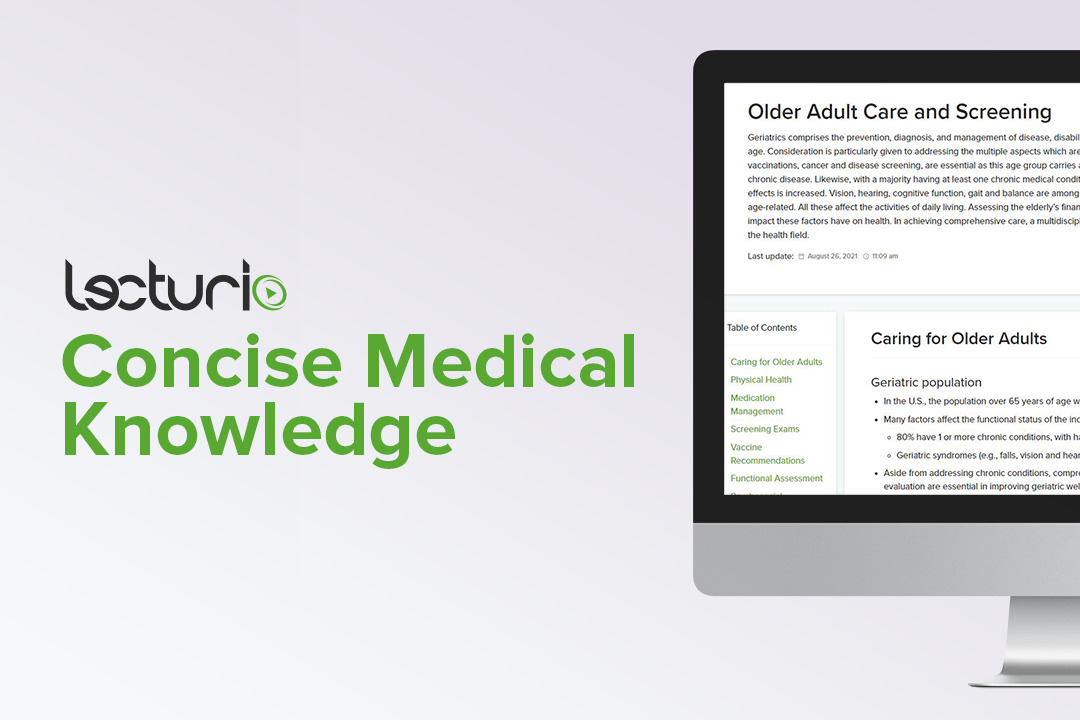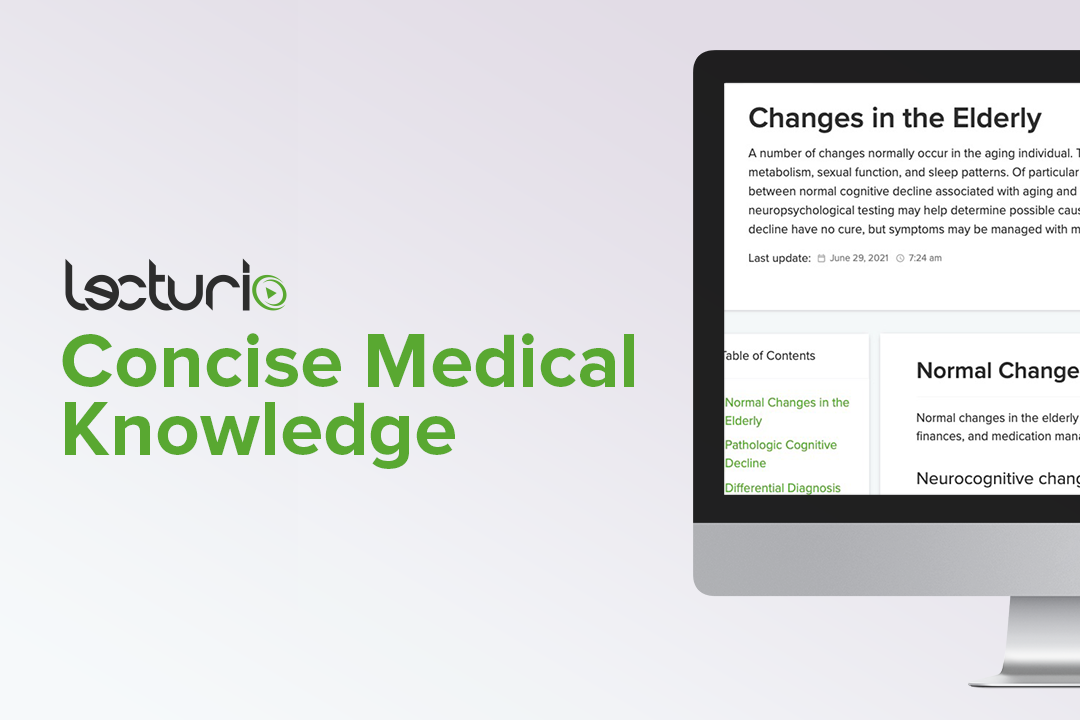Playlist
Show Playlist
Hide Playlist
Cognitive Decline among Older Adults
-
Slides CognitiveDeclineOlderAdults GeriatricCare.pdf
-
Download Lecture Overview
00:01 So, let's discuss another important subject among older adults. 00:04 It doesn't affect every older adult, but as patients age, it certainly becomes more and more prevalent. 00:10 And that's cognitive decline. 00:13 So, begin with a case. 00:14 We have a 75-year-old woman. 00:16 She has a new diagnosis of Alzheimer's disease. 00:19 Testing indicates that she has mild dementia and mild loss of function overall. 00:24 So, what is the first-line treatment for her Alzheimer's disease? Is it Ginkgo? Memantine? Behavioral treatment only? Or is it an acetylcholinesterase inhibitor? The answer is acetylcholinesterase inhibitor and we'll talk about drugs approved for the treatment of Alzheimer's disease. 00:43 Epidemiology of cognitive decline, as I mentioned, it is common. 00:49 The lifetime risk among individuals who live over 65 years is up to 20%. 00:56 The majority of those cases are due to Alzheimer's disease. 01:01 However, the United States Preventive Service Task Force recommends screening for cognitive decline only when there's clinical suspicion of decline. 01:10 And remember that, many times, it won't be the patient who tells you about cognitive decline. 01:15 It's going to be someone who knows them well. 01:17 That's going to be a family member – a son, daughter, spouse. 01:21 It's going to be somebody – a good friend or somebody they know from church because there's still a lot of stigma. 01:28 And you can imagine being diagnosed with cognitive decline is a very scary proposition. 01:34 So, there’s a lot of denial among patients and they'll stick to their routines and ignore the fact that they're getting more confused, have more trouble with memory rather than facing this very severe diagnosis. 01:48 And really, I feel a lot of empathy. 01:52 Who can blame them for feeling that way, faced with such a terrible disease? So, when there is a suspicion for cognitive decline, when I get that story, you know, I’m losing my – I feel like I'm forgetting a lot of things lately. 02:06 And this is something I hear from 35-year-olds on a regular basis, much less 75-year-olds. 02:11 You can think about doing different tests for cognition within the office. 02:16 The Mini-Mental Status Examination is probably the most widely used, although it is proprietary. 02:22 It is something that’s still under copyright. 02:24 It’s an exam. It’s fairly lengthy. 02:26 And it’s also dependent upon patient’s language and educational level. 02:30 So, I'm not saying it doesn't have a role. 02:32 It actually absolutely has a role because it’s the coin of the realm. 02:35 Their score on the MMSE means something and it’s easily understood by different providers. 02:41 But I do also like a quick screening tool like the Mini-Cog, especially for those 35-year-olds. 02:46 It's a simple test involving first a three-item recall. 02:50 And if that’s passed, the chances of any serious dementia is very, very low. 02:54 If the patient can only recall one or two items, they’re given a clock draw test. 03:01 And if that's normal, their risk of dementia is very, very low. 03:06 It has a 89% specificity for at least mild dementia overall wrong and it's not dependent on patients’ language and educational level. 03:16 So, therefore, it can be a really useful test in the clinical setting as a screener. 03:21 If it's positive, that should be followed up with more testing. 03:25 Some particular causes of dementia and their symptomatology are worth noting. 03:31 It’s not something I see a lot in clinical practice, but very well could come up on your exam. 03:36 Patients with that wide-based gait and urinary incontinence, think about normal – as well as evidence for dementia, normal pressure hydrocephalus. 03:46 Patients with ascending paresthesias, feeling weakness, akathisia and weight loss, vitamin B12 deficiency. 03:53 And then more clinically speaking, always be thinking about medications and side effects, particularly as individuals get older and particularly with anticholinergic drugs or other sedating drugs are going to have a significant effect on cognition as well. 04:08 So, when you find a case of dementia, the workup should include a CBC, a comprehensive metabolic panel, a TSH, B12 and folate levels, And in my opinion, every patient with dementia deserves at least one good neuroimaging study, preferably an MRI because it’s going to give more details. 04:28 Assessment for amyloid status with either CSF testing or or amyloid PET imaging has become a prerequisite for treatment with amyloid-targeted therapies in clinically appropriate individuals. 04:40 Unfortunately, I see patients are getting multiple studies because there is no coordination of care and that's a waste of resources. 04:47 But I think it is important to get one study just to make sure that there is no gross lesion within the brain and something that will probably confirm the fact that there’s generalized atrophy consistent with dementia, such as Alzheimer's. 05:01 So, first-line treatment for Alzheimer's, as I mentioned, are acetylcholinesterase inhibitors. 05:06 They can be used in mild disease, which is when they should be caught. 05:10 There's three agents available. 05:12 They’re generally similar in efficacy. 05:14 One comes in the form of a patch and that may be associated with better tolerability. 05:19 Overall, you can expect mild improvements in both cognition and function. 05:24 They’re statistically relevant. 05:26 Does it really matter in terms of something clinically that patients can appreciate? Generally, my opinion and overall consensus is no. 05:36 These drugs tend to hold the line and prevent – they promote a slower decline in cognitive ability and function, but they don't cause a significant improvement either for the majority of patients. 05:50 Nothing that they’ll notice. 05:52 If there's no improvement, if the patient is continuing to decline six to eight weeks later, the medicine can be discontinued and there is a significant association with nausea and vomiting and weight loss and tolerability of these drugs is problematic. 06:09 But it’s what we have for mild Alzheimer's disease. 06:13 Because there is another class of drugs, the NMDA receptor antagonists, memantine specifically, but it's indicated for more moderate to severe Alzheimer's disease, not mild disease. 06:27 And again, modest improvements overall in cognition and function and in levels of agitation, not something that you could really say, certainly not a cure, maybe something not even that the patient nor the family can particularly notice, but may just be slowing the decline of the disease. 06:45 But one thing is it's better tolerated at least than the acetylcholinesterase inhibitors. 06:50 So, we know that as well. 06:52 Monoclonal antibodies directed against beta amyloid have been approved for individuals with Alzheimer disease with mild cognitive impairment and documented amyloid pathology. 07:02 These include aducanumab and lecanemab. These medications reduce beta-amyloid plaques in the brain and have been demonstrated to slow rates of cognitive decline. As noted earlier, before starting these agents, amyloid PET or CSF testing is needed. 07:17 Additionally, MRI monitoring is required to evaluate for amyloid-related imaging abnormalities, such as edema, hemosiderin deposition, and microhemorrhages. 07:30 A very difficult disease to treat and takes a lot of time and care on your part with careful listening. 07:38 And this is another case where having a team involved can be particularly helpful just to take care of all the aspects of the patient's life from the physical to the emotional and certainly with regards to their chronic disease, including the dementia as well. 07:56 Thanks.
About the Lecture
The lecture Cognitive Decline among Older Adults by Charles Vega, MD is from the course Geriatric Care. It contains the following chapters:
- Cognitive Decline among Older Adults
- Screening for Cognitive Decline
- Findings for Particular Causes of Dementia
- Workup of Dementia
- Treatment of AD
Included Quiz Questions
What is the first-line therapy for newly diagnosed Alzheimer disease dementia?
- Acetylcholinesterase inhibitors
- Vitamin E
- Memantine
- Fish oil
- Reassurance
Which of the following conditions is associated with a classic triad of cognitive impairment, gait disturbance, and urinary incontinence?
- Normal pressure hydrocephalus
- Alzheimer disease
- Parkinson disease
- Vascular Dementia
- Neurosyphilis
Which of the following blood tests is indicated in a patient with cognitive impairment and dementia?
- Vitamin B12 level
- Complete blood count
- Liver function tests
- Folate level
- Erythrocyte sedimentation rate
Which of the following is the most common cause of dementia?
- Alzheimer disease
- Alcoholic dementia
- Vascular dementia
- Parkinson disease
- Hepatic encephalopathy
Which of the following best describes the Mini-Cog test?
- Recall of 3 unrelated words and a clock-drawing test
- 3 temporal orientation questions and recall of 3 unrelated words
- 3 temporal orientation questions and a clock-drawing test
- A clock-drawing test, 3 temporal orientation questions, and recall of 3 unrelated words
- None of the options provided is correct.
Customer reviews
5,0 of 5 stars
| 5 Stars |
|
1 |
| 4 Stars |
|
0 |
| 3 Stars |
|
0 |
| 2 Stars |
|
0 |
| 1 Star |
|
0 |
Great sequence of screening, diagnostics, treatment and care. Good use of audiovisual support.






